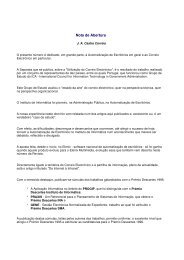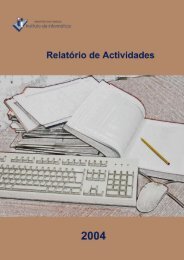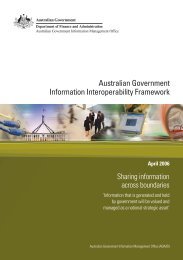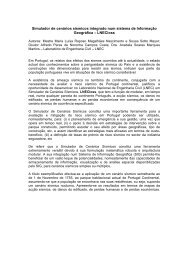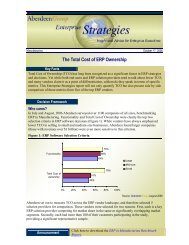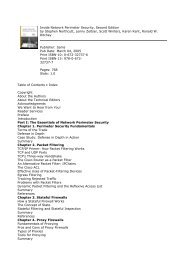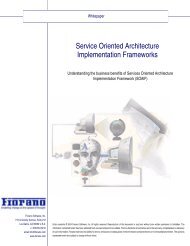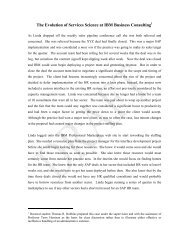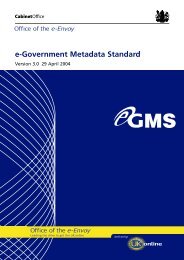OECD Peer Review of E-Government in Denmark - ePractice.eu
OECD Peer Review of E-Government in Denmark - ePractice.eu
OECD Peer Review of E-Government in Denmark - ePractice.eu
You also want an ePaper? Increase the reach of your titles
YUMPU automatically turns print PDFs into web optimized ePapers that Google loves.
8. Monitor<strong>in</strong>g and evaluation<br />
<strong>Denmark</strong> has set clear e-government targets for all public sector organisations, and backed these<br />
up with measures for assess<strong>in</strong>g achievement <strong>of</strong> the targets. Organisations, while hav<strong>in</strong>g some concerns<br />
over how achievements will be measured, have found these targets helpful. However, the effect <strong>of</strong><br />
monitor<strong>in</strong>g and evaluation aga<strong>in</strong>st the targets is yet to be seen. It is not clear how monitor<strong>in</strong>g will<br />
relate to achievement <strong>of</strong> goals, and how the results <strong>of</strong> monitor<strong>in</strong>g will be used to <strong>in</strong>form future<br />
e-government developments or to manage organisational performance. It is also not clear what<br />
consequences there are for non-participation, either <strong>in</strong> the overall achievement <strong>of</strong> the strategy, or <strong>in</strong> its<br />
various objectives and <strong>in</strong>itiatives (e.g. uptake <strong>of</strong> <strong>in</strong>teroperability standards).<br />
E-government <strong>in</strong>itiatives <strong>in</strong> <strong>Denmark</strong> are not generally proposed, monitored and evaluated on the<br />
basis <strong>of</strong> a sound and consistently applied approach to develop<strong>in</strong>g a bus<strong>in</strong>ess case detail<strong>in</strong>g their<br />
expected f<strong>in</strong>ancial, economic and social costs, benefits and risks. This problem, which is widely<br />
believed by government organisations to have a negative effect on the overall quality <strong>of</strong> e-government<br />
projects, has been addressed <strong>in</strong> the current e-government strategy. Some tools to assist organisations <strong>in</strong><br />
improv<strong>in</strong>g their performance <strong>in</strong> this area have been developed by the Digital Task Force and the<br />
M<strong>in</strong>istry <strong>of</strong> Science, Technology and Innovation. However, their use is not mandatory, and they<br />
require further development and communication.<br />
Overall, there is an apparent lack <strong>of</strong> demand and supply <strong>of</strong> rigorous monitor<strong>in</strong>g and evaluation <strong>of</strong><br />
e-government, either by the Parliament or the <strong>Government</strong>, which stands <strong>in</strong> contrast to the practices <strong>of</strong><br />
many other <strong>OECD</strong> countries. Monitor<strong>in</strong>g and evaluation <strong>of</strong> e-government is a largely discretionary<br />
activity given relatively low priority by many Danish government organisations. The monitor<strong>in</strong>g and<br />
evaluation work be<strong>in</strong>g undertaken is biased towards <strong>in</strong>dividual organisations and the users <strong>of</strong> their<br />
services, and is undertaken <strong>in</strong>ternally rather than externally to a very significant degree. Results <strong>of</strong><br />
monitor<strong>in</strong>g and evaluation are not widely diffused outside most organisations, and there appears to be<br />
little external demand for this type <strong>of</strong> <strong>in</strong>formation. It should be noted, however, that the question <strong>of</strong><br />
robust ex post evaluation <strong>of</strong> e-government is just start<strong>in</strong>g to emerge as a major issue <strong>in</strong> lead<strong>in</strong>g <strong>OECD</strong><br />
e-government nations. Any efforts <strong>Denmark</strong> might make to improve its performance <strong>in</strong> this area<br />
would be <strong>in</strong> advance <strong>of</strong> the majority <strong>of</strong> its peers.<br />
There has been no explicit monitor<strong>in</strong>g <strong>of</strong> e-government by the National Audit Office (NAO) so<br />
far. This means that the Parliament is not as strongly positioned to exercise its role <strong>in</strong> ensur<strong>in</strong>g the<br />
accountability <strong>of</strong> the executive for achiev<strong>in</strong>g e-government goals as it could be, and the public has<br />
little <strong>in</strong>dependent <strong>in</strong>formation available about the progress <strong>of</strong> e-government. If the NAO or any other<br />
body does conduct an audit <strong>of</strong> e-government, it is important that its approach be congruent with both<br />
the objectives and design <strong>of</strong> the e-government strategy, <strong>in</strong> order to ensure that the Parliament is not<br />
provided with spurious assessment <strong>of</strong> the Danish e-government programme.<br />
F<strong>in</strong>ally, there is a proposal to establish an <strong>in</strong>dependent municipal “evaluation <strong>in</strong>stitute” as part <strong>of</strong><br />
the Structural Reform. There is strong consensus that this should contribute to improved performance<br />
<strong>of</strong> local government. However, it is not clear whether the <strong>in</strong>stitute will focus on e-government as part<br />
<strong>of</strong> its activities. It would seem sensible that, if e-government is to become an area <strong>of</strong> focus for the new<br />
<strong>in</strong>stitute, then the approach taken should reflect awareness <strong>of</strong> the whole-<strong>of</strong>-government context for<br />
local e-government efforts, and be designed to support collaboration across different levels <strong>of</strong><br />
government.<br />
24



